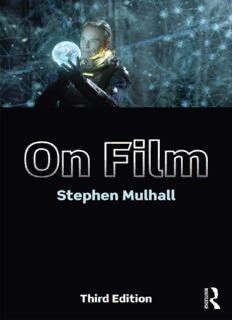
On Film PDF
Preview On Film
On Film The first edition of Stephen Mulhall’s acclaimed On Film was a study of the four Alien films, andmadethehighlyoriginalandcontroversialargumentthatfilmsthemselvescanphilosophize. In its second edition,OnFilmincreasedits breadth and vision considerably to encompass films such as the Mission: Impossible series and Steven Spielberg’s Minority Report. InthissignificantlyexpandedthirdeditionStephenMulhalladdsnewchaptersontheJason Bourne films, the fourth Mission: Impossible movie, J.J. Abrams’ Star Trek and Star Trek: Into Darkness,andRidleyScott’sPrometheus(inwhichhereturnstotheAlienuniversehecreated).In sodoing,Mulhallreappraisesinfascinatingwaysthecentralissuestakenupinearliereditions of On Film: the genres of science fiction and thriller, the impact of digital asopposed to photo- graphicmodesoftechnologyonthenatureofcinemaasamedium(anditsrelationtotelevision), andthefateofsequeldominmainstreamcontemporarycinema(withitsemphasisonremakes, reboots and multi-media superhero franchises). On Film, third edition, is essential reading for anyone interested in philosophy, film theory andculturalstudies, andinthe wayphilosophy canenrichourunderstandingof cinema. Stephen Mulhall is a Professor of Philosophy, and a Tutorial Fellow of New College,Oxford, UK. Heis the author of The Routledge Guidebook to Heidegger’s Being andTime(2005, 2013), The ConversationofHumanity(2007),andTheSelfanditsShadows(2013). This page intentionally left blank On Film Third edition Stephen Mulhall Add Add Add AddAddAdd Add AddAdd AdAddd Thirdeditionpublished2016 byRoutledge 2ParkSquare, MiltonPark,Abingdon, OxonOX144RN andbyRoutledge 711ThirdAvenue,NewYork,NY10017 Routledge isanimprint oftheTaylor &FrancisGroup,aninformabusiness ©2016StephenMulhall TherightofStephenMulhalltobeidentifiedastheauthorofthisworkhasbeenasserted byhiminaccordance withsections77and78oftheCopyright,DesignsandPatentsAct 1988. Allrightsreserved.Nopartofthisbookmaybereprintedorreproducedorutilizedinany formorbyanyelectronic,mechanical,orothermeans,nowknownorhereafterinvented, including photocopyingandrecording, orinanyinformationstorage orretrievalsystem, withoutpermission inwriting fromthepublishers. Trademarknotice: Productorcorporatenames maybetrademarks orregistered trademarks,andareusedonlyforidentificationandexplanationwithoutintenttoinfringe. Firstedition publishedbyRoutledge 2001 Secondedition publishedbyRoutledge 2008 British LibraryCataloguing inPublication Data Acataloguerecordfor thisbookisavailablefromtheBritishLibrary LibraryofCongress Cataloging inPublication Data Mulhall,Stephen, 1962- Onfilm/byStephenMulhall.–Thirdedition. pagescm Includesbibliographical referencesandindex. 1.Alien(Motionpicture)2.Sciencefiction films–Historyandcriticism. 3.Motionpictures– Philosophy.I.Title. PN1997.A32253M852016 791.4375–dc23 2015024401 ISBN:978-1-138-79684-3 (hbk) ISBN:978-1-138-79685-0 (pbk) ISBN:978-1-315-75759-9 (ebk) Typeset inGaramond andGillSans byTaylor&FrancisBooks For Eleanor and Matthew This page intentionally left blank Contents Preface to the third edition ix Preface to the second edition xiii PARTI 1 Introduction 3 1 Kane’s son, Cain’s daughter: Ridley Scott’s Alien 9 2 Making babies: James Cameron’s Aliens 31 3 Mourning sickness: David Fincher’s Alien3 52 4 The monster’s mother: Jean-Pierre Jeunet’s Alien Resurrection 71 PARTII 83 5 Film as philosophy: The priority of the particular 85 6 PreCrime, precognition and the pre-reflective cogito: Steven Spielberg’s Minority Report 104 PARTIII 125 7 The impersonation of personality: Brian De Palma’s Mission: Impossible 127 8 The burden of sex: John Woo’s Mission: Impossible II 142 9 An accelerated mutator: J.J. Abrams’ Mission: Impossible III 151 PARTIV 171 10 The legacy of Jason Bourne: Identity and the sinfulness of origins 173 viii Contents 11 The Enterprise, the Botany Bay and the Kobayashi Maru: Rebooting Star Trek with Khan’s wrath and Abrams’ red matter 188 12 The disavowal of animation: Brad Bird’s Mission: Impossible – Ghost Protocol 207 13 Cinematic repetition and how to avoid it: Sequels, prequels and Prometheus 223 References 239 Index 241 Preface to the third edition When I began to consider the possibility of a third edition of this book, I initially pictured it as modifying the second edition in just the way that the second edition modified the first – that is, as further testing the interpretative model employed in the first edition by applying it to another sequence of films possessed of the char- acteristicsthatmadetheAlienseriesandtheMission:Impossible series so appropriate for my purposes. That would have required identifyinga third set ofinterlinked films set in a distinctive cinematic universe (and ideally centred on a single protagonist), with each individual film exemplifying the work of a different director, and thereby invitingconsiderationinrelationtootherfilmsbythatsamehandoreyeaswellasin relation to its predecessors. Such sequences remain rare; but there was one plausible candidate – the series of movies about Jason Bourne (The Bourne Identity [2002], dir. DougLiman;The Bourne Supremacy [2004], dir.Paul Greengrass; The Bourne Ultimatum [2007], dir. Paul Greengrass; and The Bourne Legacy [2012], dir. Tony Gilroy). To be sure, there were anomalies: Greengrass has directed two instalments of the series, but he relates them so tightly to one another that they could well be counted as a single extended episode; and Jason Bourne himself is absent from the fourth film, but the mode of his absence is such as to make this film’s internal relation to its predecessors more insistent and more interesting. If I could make a discussion of this series the centrepiece of the new edition, then I would also be able to update my discussions of the previous two series – a pressing concern from my point of view, since the Mission: Impossible series had recently acquired a fourth instalment (subtitled Ghost Protocol [2011]), directed by Brad Bird (whose origins in Pixar and digital animation more generally made the question of Hollywood’s accelerating transition from celluloid to CGI unavoidable), and the originator of the Alien series had more recently returned to that universe with Pro- metheus (2012:dir.RidleyScott).Suchupdatingmightalsoinclude morerecent work by some of the directors involved in those two series: I had caught up with David Fincher’swork after Alien3 inthesecond edition ofmybook,buthehasbeen equally productive since then; and ofcourse J.J.Abrams’work since Mission:Impossible III has been highly influential, as well as having a particular bearing on my interest in sequels and their conditions of possibility (with his rebooting of the Star Trek franchise, and his impending resuscitation of Star Wars).
Description: